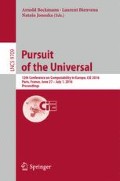Abstract
Secret sharing concerns the distribution of some secret information among a number of parties and is among the most well known tools in cryptography. Secret sharing schemes with certain additional algebraic properties, known as linearity and multiplicativity, have important applications in the area of secure multiparty computation and other areas such as zero knowledge proofs. Secret sharing also has a strong relationship with coding theory and motivates new problems in that field. I will survey several of the recent results in the area and some of their applications.
A major part of this work was written while the author was working at the Department of Computer Science, Aarhus University, Denmark.
Access this chapter
Tax calculation will be finalised at checkout
Purchases are for personal use only
Notes
- 1.
Furthermore, in the case \(k>1\), one can replace the k evaluation points for the secret by a primitive element of the extension field \(\mathbb {F}_{q^k}\), whereby one only needs \(n\le q-1\), and the privacy and reconstruction thresholds are preserved. The multiplicativity properties hold now with respect to the product in \(\mathbb {F}_{q^k}\) (for the secrets) instead of the coordinate-wise product in \(\mathbb {F}_q^k\).
- 2.
Here we suppose each pair of players is connected by a secure point-to-point channel, but we do not assume the existence of a broadcast channel.
References
Ben-Or, M., Goldwasser, S., Wigderson, A.: Completeness theorems for non-cryptographic fault-tolerant distributed computation. In: Proceedings of STOC 1988, pp. 1–10. ACM Press (1988)
Cascudo, I., Chen, H., Cramer, R., Xing, C.: Asymptotically good ideal linear secret sharing with strong multiplication over any fixed finite field. In: Halevi, S. (ed.) CRYPTO 2009. LNCS, vol. 5677, pp. 466–486. Springer, Heidelberg (2009)
Cascudo, I., Cramer, R., Mirandola, D., Zemor, G.: Squares of random linear codes. IEEE Trans. Inf. Theor. 61(3), 1159–1173 (2015)
Cascudo, I., Cramer, R., Xing, C.: The torsion-limit for algebraic function fields and its application to arithmetic secret sharing. In: Rogaway, P. (ed.) CRYPTO 2011. LNCS, vol. 6841, pp. 685–705. Springer, Heidelberg (2011)
Cascudo, I., Cramer, R., Xing, C.: The arithmetic codex. In: Proceedings of IEEE Information Theory Workshop (ITW 2012), pp. 75–79 (2012)
Cascudo, I., Cramer, R., Xing, C.: Bounds on the threshold gap in secret sharing and its applications. IEEE Trans. Inf. Theor. 59(9), 5600–5612 (2013)
Cascudo, I., Cramer, R., Xing, C.: Torsion limits and Riemann-Roch systems for function fields and applications. IEEE Trans. Inf. Theor. 60(7), 3871–3888 (2014)
Cascudo, I., Damgård, I., David, B., Giacomelli, I., Nielsen, J.B., Trifiletti, R.: Additively homomorphic UC commitments with optimal amortized overhead. In: Katz, J. (ed.) PKC 2015. LNCS, vol. 9020, pp. 495–515. Springer, Heidelberg (2015)
Chaum, D., Crépeau, C., Damgård, I.: Multi-party unconditionally secure protocols. In: Proceedings of STOC 1988, pp. 11–19. ACM Press (1988)
Chen, H., Cramer, R.: Algebraic geometric secret sharing schemes and secure multi-party computations over small fields. In: Dwork, C. (ed.) CRYPTO 2006. LNCS, vol. 4117, pp. 521–536. Springer, Heidelberg (2006)
Chen, H., Cramer, R., Goldwasser, S., de Haan, R., Vaikuntanathan, V.: Secure computation from random error correcting codes. In: Naor, M. (ed.) EUROCRYPT 2007. LNCS, vol. 4515, pp. 291–310. Springer, Heidelberg (2007)
Cramer, R., Damgård, I.B., Maurer, U.M.: General secure multi-party computation from any linear secret-sharing scheme. In: Preneel, B. (ed.) EUROCRYPT 2000. LNCS, vol. 1807, pp. 316–334. Springer, Heidelberg (2000)
Cramer, R., Damgård, I., Nielsen, J.B.: Secure Multiparty Computation and Secret Sharing - An Information Theoretic Approach. Cambridge University Press
Cramer, R., Damgård, I., Pastro, V.: On the amortized complexity of zero knowledge protocols for multiplicative relations. In: Smith, A. (ed.) ICITS 2012. LNCS, vol. 7412, pp. 62–79. Springer, Heidelberg (2012)
Cramer, R., Xing, C., Yuan, C.: On Multi-point Local Decoding of Reed-Muller Codes. Manuscript (2016). http://arxiv.org/abs/1604.01925
Damgård, I., David, B., Giacomelli, I., Nielsen, J.B.: Compact VSS and efficient homomorphic UC commitments. In: Sarkar, P., Iwata, T. (eds.) ASIACRYPT 2014, Part II. LNCS, vol. 8874, pp. 213–232. Springer, Heidelberg (2014)
Damgård, I., Zakarias, S.: Constant-overhead secure computation of Boolean circuits using preprocessing. In: Sahai, A. (ed.) TCC 2013. LNCS, vol. 7785, pp. 621–641. Springer, Heidelberg (2013)
Frederiksen, T.K., Jakobsen, T.P., Nielsen, J.B., Trifiletti, R.: On the complexity of additively homomorphic UC commitments. In: Kushilevitz, E., et al. (eds.) TCC 2016-A. LNCS, vol. 9562, pp. 542–565. Springer, Heidelberg (2016). doi:10.1007/978-3-662-49096-9_23
Garcia, A., Stichtenoth, H.: A tower of Artin-Schreier extensions of function fields attaining the Drinfeld-Vlǎduţ bound. Inventiones Math. 121, 211–222 (1995)
Harnik, D., Ishai, Y., Kushilevitz, E., Nielsen, J.B.: OT-combiners via secure computation. In: Canetti, R. (ed.) TCC 2008. LNCS, vol. 4948, pp. 393–411. Springer, Heidelberg (2008)
Ishai, Y., Kushilevitz, E., Ostrovsky, R., Prabhakaran, M., Sahai, A., Wullschleger, J.: Constant-rate oblivious transfer from noisy channels. In: Rogaway, P. (ed.) CRYPTO 2011. LNCS, vol. 6841, pp. 667–684. Springer, Heidelberg (2011)
Ishai, Y., Kushilevitz, E., Ostrovsky, R., Sahai, A.: Zero-knowledge from secure multiparty computation. In: Proceedings of 39th STOC, San Diego, CA, USA, pp. 21–30 (2007)
Ishai, Y., Kushilevitz, E., Ostrovsky, R., Sahai, A.: Extracting correlations. In: Proceedings of 50th IEEE FOCS, pp. 261–270 (2009)
Ishai, Y., Prabhakaran, M., Sahai, A.: Founding cryptography on oblivious transfer – efficiently. In: Wagner, D. (ed.) CRYPTO 2008. LNCS, vol. 5157, pp. 572–591. Springer, Heidelberg (2008)
Massey., J.: Minimal codewords and secret sharing. In: Proceedings of the 6th Joint Swedish-Russian International Workshop on Information Theory (1993)
Shamir, A.: How to share a secret. Commun. ACM 22(11), 612–613 (1979)
Author information
Authors and Affiliations
Corresponding author
Editor information
Editors and Affiliations
Rights and permissions
Copyright information
© 2016 Springer International Publishing Switzerland
About this paper
Cite this paper
Cascudo, I. (2016). Secret Sharing Schemes with Algebraic Properties and Applications. In: Beckmann, A., Bienvenu, L., Jonoska, N. (eds) Pursuit of the Universal. CiE 2016. Lecture Notes in Computer Science(), vol 9709. Springer, Cham. https://doi.org/10.1007/978-3-319-40189-8_7
Download citation
DOI: https://doi.org/10.1007/978-3-319-40189-8_7
Published:
Publisher Name: Springer, Cham
Print ISBN: 978-3-319-40188-1
Online ISBN: 978-3-319-40189-8
eBook Packages: Computer ScienceComputer Science (R0)

